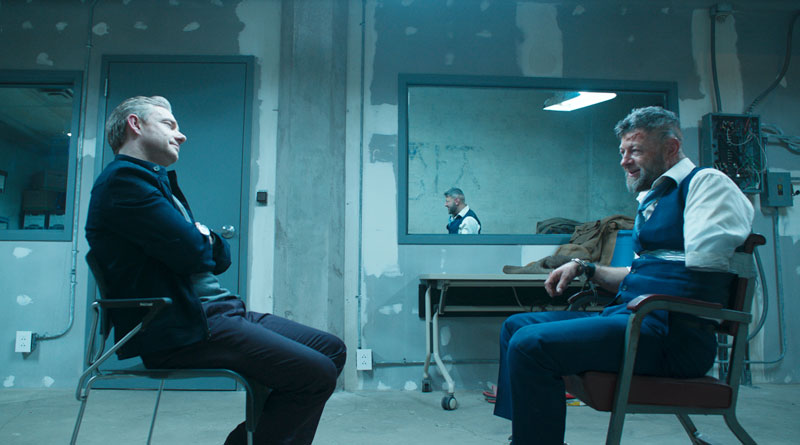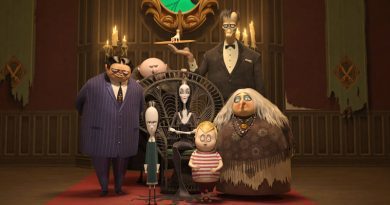Black Panther (2018) Review
T’Challa a.k.a. Black Panther (Chadwick Boseman) returns to his homeland of Wakanda after his father’s (John Kani) death in Captain America: Civil War. Officially crowned as the new king, he is now facing not one but two threats in the form of an arms dealer named Ulysses Klaue (Andy Serkis) and Erik Killmonger (Michael B. Jordan), an ex-soldier who has a personal vendetta against T’Challa.
The first time we get a superhero movie filled with a predominantly black cast was The Meteor Man back in 1993, which starred and directed by Robert Townsend. Fast forward to 2018, we have Black Panther which features Marvel’s first black superhero as a lead character in the MCU era. And of course, a major superhero blockbuster where the cast is largely African-American. The titular character is again played by the charismatic Chadwick Boseman, in which he carries his role with the same dramatic weight and physical intensity previously hinted in 2016’s Captain America: Civil War.
But Boseman isn’t the only one who shines in the ensemble cast. Kudos go to Marvel for making the right choice hiring Ryan Coogler, the acclaimed young director who has a knack for bringing out the best in his actors. This was evidently seen in his 2013 Sundance darling, Fruitvale Station and the well-received Rocky spin-off, Creed. Although Black Panther is his first big-budget project, he manages to inject most of his auteur style we come to know from his previous two movies while simultaneously retaining the Marvel-friendly formula. Here, he made great use of his talented ensemble cast regardless of supporting or minor roles.

For the third time in a row, Coogler cast his favourite which is none other than Michael B. Jordan. But instead of a lead protagonist, it’s nice to see him playing an antagonist for a change. As the vengeful Erik Killmonger, Jordan has no doubt portrayed one of his best performances to date since his breakthrough role in Fruitvale Station. Jordan’s Erik Killmonger is also a great Marvel villain, joining the MCU ranks of Tom Hiddleston’s Loki and Michael Keaton’s Adrian Toomes/Vulture before him. Coogler, in which he also co-writes alongside Joe Robert Cole of TV’s American Crime Story, successfully fleshed out his character more than just your average comic-book antagonist. Killmonger is given a compelling backstory along with a strong motivation for why he is determined to bring down T’Challa and take over the throne as the new king of Wakanda.
Black Panther also includes another memorable Marvel villain in the form of Ulysses Klaue, played with gleeful nastiness by Andy Serkis. First introduced in Avengers: Age of Ultron (2015), Serkis certainly has a field day reprising his role for the second time. Other casts including Daniel Kaluuya as T’Challa’s best friend, W’Kabi, Martin Freeman as CIA agent Everett K. Ross, Forest Whitaker as the Wakanda elder Zuri and even Winston Duke’s minor appearance as Jabari’s head warrior, M’Baku, all delivered excellent supports.

Although Black Panther is largely dominated by a male cast, Coogler still makes enough rooms for the female stars to shine as well. Lupita Nyong’o and Danai Gurira are both engaging in their respective roles as T’Challa’s ex-lover Nakia and Wakanda’s head bodyguard Okoye. Letitia Wright of TV’s Humans delivers a standout supporting performance as T’Challa’s tech-savvy sister, Shuri and there are few times she steals the show in this movie. Finally, Angela Bassett round up the female cast with her committed performance as T’Challa’s mother, Ramonda.
As for the story, Coogler and Robert Cole’s screenplay gamely explores topical issues of culture and diversity as well as addressing real-world conflicts that reflect on today’s political climate. I have to say this is undoubtedly the most politically-charged Marvel movie ever seen since 2014’s Captain America: The Winter Soldier. At the same time, Coogler and Robert Cole manage to balance their storyline’s hot-button issues with a robust mix of family drama and yes, a dash of James Bond-like espionage undertone. This is particularly evident during the Busan sequence, complete with a casino set-piece most 007 fans would have no problem identifying it. Coogler even upped the ante with one of the best action sequences in the MCU era: an elaborate nighttime car chase along the streets of Busan, which is both exhilarating and humorous.

Black Panther is also a triumph of elaborate yet fully-realised production design, evidently seen in the high-tech cityscape of Wakanda. The same goes for Ruth E. Carter’s equally praiseworthy sumptuous costume design. Ludwig Göransson’s African-inspired drumbeat-heavy tribal score is particularly unique in its musical arrangement, which distinguishes itself from other MCU movie.
As much as I enjoyed Black Panther, it is far from a perfect MCU movie. The CG tends to be sloppy and cartoonish at times, which in turn, hampered some of the action sequences. It doesn’t help either when the action moves too fast due to Coogler’s sometimes hyperactive camerawork. Despite its minor shortcomings, Black Panther remains a great addition to the MCU. Likewise, do not leave your seats once the end credits start rolling. Stay back until the very end because there will be mid-credit and post-credit teasers.





